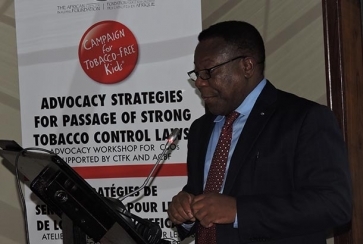
“Tobacco consumption is still a real challenge for Africa and effective and sustainable solutions are needed for strong legislation,” stated African Capacity Building Foundation’s (ACBF) Executive Secretary, Prof Emmanuel Nnadozie at the tobacco control advocacy coordination training workshop that started on Monday, 29 August 2016.
The five days’ advocacy workshop for Civil Society Organizations jointly organized by the ACBF and the Campaign for Tobacco Free Kids (CTFK) kicked off yesterday at the Meikles Hotel in Harare, Zimbabwe to address how to effectively pass and implement tobacco control laws in African countries.
“Tobacco use is the world’s leading cause of preventable death, with nearly 6 million people dying of tobacco-related diseases each year. There is need for strong legislation to be in place as well as human and institutional capacity such as, the capacity for research, advocacy, and implementation of tobacco control legislation,” noted Prof Nnadozie.
According to data from WHO’s Global Health Observatory, in 2015 over 1.1 billion people smoked tobacco. Although it is declining worldwide and in many countries, the prevalence of tobacco smoking appears to be increasing in the WHO Eastern Mediterranean Region and the African Region which Prof Nnadozie stated as “worrisome, especially if nothing is done.”
Quite worrisome is also that many African countries are facing problems to pass comprehensive tobacco control laws, which could help them not only protect their populations but also make the tobacco industry accountable for the damage caused around the continent.
The advocacy workshop aims to enhance understanding and impart skills in advocacy and leadership for CSOs to be able to advocate for the passage of Tobacco Control (TC) Bill and effective implementation of TC laws in target.
“It’s really good to see advocates from different countries come together to exchange and learn from one another what has made them progress or regress in their process of advancing their national law,” noted Ms Bintou Camara, Acting Head of African Programs under CTFK while making her remarks at the start of the workshop.
However, Ms Camara foresees challenges ahead as the tobacco industry continues to market their products and seek new markets.
She said, “We all know there will be continued struggle, evolving methods and ruses from the industry to keep on holding on, at any cost. Just as much as they’re becoming more sophisticated and aggressive, the more we need to be even more vigilant, better planners, more strategic and determined to win this.”
“Tobacco control is a joint effort. Alone, you will get defeated. There is need for strong advocates as tobacco has many sector interested,” said Dr. William Maina, Senior Project Officer, WHO Africa Regional Office in Uganda.
He added, “The WHO Framework Convention on Tobacco Control (FCTC) recognizes the role of CSOs. We therefore have to keep talking about tobacco control as tobacco use is retarding social and economic development.
At the workshop, the role of the CSOs was pointed out as important and very strategic especially in providing the right information to governments, conducting advocacy for the ratification of the FCTC, and monitoring and denouncing interferences of the tobacco industry.
It was unanimously agreed that CSOs in Africa should therefore be constantly mobilized in order to conduct intense advocacy for the passage and implementation without delay of tobacco control legislations. An area where capacity is needed.
Strengthening the human and institutional capacity of all the partners involved in tobacco control in Africa is the only guarantee for sustainable results noted Prof Nnadozie.
The five day workshop closes on 2 September 2016.





